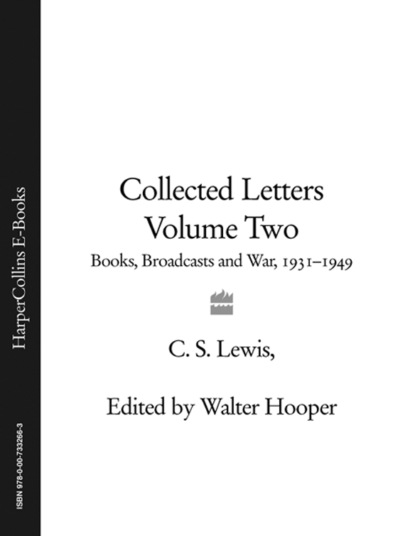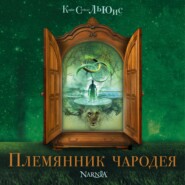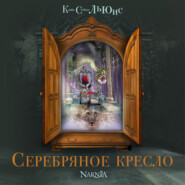По всем вопросам обращайтесь на: info@litportal.ru
(©) 2003-2025.
✖
Collected Letters Volume Two: Books, Broadcasts and War, 1931–1949
Настройки чтения
Размер шрифта
Высота строк
Поля
2 (#ulink_0a45268e-7573-5ba4-a91c-1c2ff139e081) Milton, Paradise Lost, XII, 641–4: ‘They, looking back, all the eastern side beheld/Of Paradise, so late their happy seat./Waved over by that flaming brand, the gate/With dreadful faces thronged and fiery arms.’
3 (#ulink_61c6c09b-3152-5f37-ac94-d0dc0f0c0569) Boswell, The Life of Samuel Johnson, vol. 1,1759, letter to Joseph Simpson, p. 347: ‘Omit no decent nor manly degree of importunity.’
4 (#ulink_61c6c09b-3152-5f37-ac94-d0dc0f0c0569)Deo volente— ‘God willing’.
5 (#ulink_61c6c09b-3152-5f37-ac94-d0dc0f0c0569) This was probably his friend of undergraduate days, Alfred Kenneth Hamilton Jenkin. See note 3 to the letter to Hamilton Jenkin of 11 January 1939.
6 (#ulink_50a68956-883c-5d98-ad48-3c3a43fdd8d9) Barfield had finally completed his poetic drama, Orpheus, which is first mentioned in the poem Lewis included in his letter to Barfield of 5 April 1935. The play was performed on stage in 1948 and was eventually published as Orpheus: A Poetic Drama, ed., with an afterword by John C. Ulreich, Jr (West Stockbridge, Massachusetts, Lindisfarne Press, 1983). In the foreword to the published work Barfield wrote: ‘I had casually mentioned to my friend C. S. Lewis that I seemed to be feeling an impulse to write a play in verse and was wondering about a subject…He said in effect: “Why not take one of the myths and simply do your best with it—Orpheus for instance?”…Apart from the actual writing, the “getting down to it” consisted almost exclusively of a careful re-reading, with a classical dictionary beside me, of Virgil’s presentation of the myth in the fourth Georgic.’
7 (#ulink_fe17354e-b65b-5ee0-b0ae-edfe5cbf8458) A character in Spenser, The Faerie Queene, III, iv.
8 (#ulink_fe17354e-b65b-5ee0-b0ae-edfe5cbf8458) Percy Bysshe Shelley, The Witch of Atlas (1824).
9 (#ulink_1aef572d-6ed5-5707-ba2f-dae402c0463b) William Godwin, Enquiry Concerning Political Justice (1793).
10 (#ulink_1aef572d-6ed5-5707-ba2f-dae402c0463b) Percy Bysshe Shelley married Godwin’s daughter, Mary.
11 (#ulink_b98438e9-a651-5661-a1e0-5ce997aee2a6) Griffiths published the two-part story of his conversion to Catholicism in the Benedictine periodical, Pax. nos. 198 and 199 (April/May 1938).
12 (#ulink_b98438e9-a651-5661-a1e0-5ce997aee2a6)Pax, no. 198, p. 8: ‘[At Oxford] found friends who were of a like mind with myself, and the love of nature and poetry became the ruling passion of our lives. We sought out the solitude of the hills and the sea, whenever it was possible, and passed whole days, and weeks in the vacation, in reading and walking, in silent communion with nature. All out philosophy was to live according to nature, and all our religion was the worship of nature.’
13 (#ulink_b98438e9-a651-5661-a1e0-5ce997aee2a6) ibid., p. 9: ‘I…found in them [St Augustine’s Confessions) the idealism of Berkeley taken up into a magnificent system of Christian philosophy, and the “intellectual love” of Spinoza transformed into a deep passion of religious love.’
14 (#ulink_b98438e9-a651-5661-a1e0-5ce997aee2a6) ibid.: ‘The discovery, strange as it may seem, that another [Lewis] had been led to the Christian faith by the path of philosophy which I was pursuing, and had found the fulfilment of his philosophy in his faith, was an inspiration which was destined never to fade.’
15 (#ulink_d20e3563-d01e-5174-9903-f78fca4d3c9c)Pax, no. 199, p. 31: ‘I decided that Anglicanism represented as pure a form of Christianity as I could find…But nothing could bring me any peace…I went up into a chapel at the top of the mission house, in which I was staying, one evening to pray, and there the thought came to me that I must make an effort to break with this world, which was destroying the peace of my soul. I formed a resolution that I would not go to bed that night, but would spend the whole night in prayer. It is difficult to describe the agony which 1 endured.’
16 (#ulink_607f52eb-0bac-5ac5-b4c3-921240d2251f) See Sir John Betjeman in the Biographical Appendix.
17 (#ulink_d053f5a7-b3a4-5561-a776-a1a0baa63afd) White at Oxford Betjeman had become friends with Professor Richard MacGillivray Dawkins (1871–1955), Director of the British School of Archaeology, Athens, 1906–14, and Bywater and Southby Professor of Byzantine and Modern Greek Language and Literature at Oxford, 1922–39. Lewis and Dawkins had been members of Tolkien’s Icelandic Society.
18 (#ulink_d9dc52e6-b534-5bc5-ba92-f276b7b58c8a) Charles Williams, He Came Down From Heaven (London: Heinemann, 1938).
19 (#ulink_d9dc52e6-b534-5bc5-ba92-f276b7b58c8a) ibid., ch. 1, pp. 5–6: ‘it might be said that the Bible, up to and including the Acts of the Apostles, is concerned rather with what happened, the Rituals with what is happening. The Epistles belong to both. It is true that all that did happen is a presentation of what is happening; all the historical events, especially of this category, area pageant of the events of the human soul. But it is true also that Christendom has always held that the two are indissolubly connected; that the events in the human soul could not exist unless the historical events had existed. If, per impossibile, it could be divinely certain that the historical events upon which Christendom reposes had not yet happened, all that could be said would be that they had not yet happened.’
20 (#ulink_d9dc52e6-b534-5bc5-ba92-f276b7b58c8a) ibid., pp. 7–8: ‘It is the habit nowadays to talk of the Bible as great literature; the Bible-worship of our forefathers has been succeeded by a more misguided and more offensive solemnity of conditioned respect, as accidentally uncritical as deliberately irreligious. Uncritical, because too often that literary respect is oddly conditioned by an ignoring of the book’s main theme.’
21 (#ulink_d9dc52e6-b534-5bc5-ba92-f276b7b58c8a) ibid., ch. 2, p. 25: ‘The distinction between necessary belief and unnecessary credulity is as necessary as belief; it is the heightening and purifying of belief. There is nothing that matters of which it is not sometimes desirable to feel: “this does not matter.” “This also is Thou; neither is this Thou.” But it may be admitted also that this is part of the technique of belief in our present state; not even Isaiah or Aquinas have pursued to its revelation the mystery of self-scepticism in the divine. The nearest, perhaps, we can get to that is in the incredulous joy of great romantic moments—in love or poetry or what else: “this cannot possibly be, and it is”. Usually the way must be made ready for heaven, and then it will come by some other; the sacrifice must be made ready, and the fire will strike on another altar,’
22 (#ulink_21bbe057-123b-5e7d-9cce-80d0783cbb2f)The Rambler was a twice-weekly periodical in 208 numbers issued by Dr Samuel Johnson between 20 March 1750 and 14 March 1752. The quotation comes from no. 113 (16 April 1751), ‘The History of Hymenaeus’s Courtship’ (The Rambler, ed. W. J. Bate and Albrecht B. Strauss, Yale Edition of the Works of Samuel Johnson, vol. IV (1969), p. 239).
23 (#ulink_d84d53ee-9f5e-5353-acd7-9c156e9f0af6) ibid, no. 123 (21 May 1751), ‘The Young Trader Turned Gentleman’, p. 291.
24 (#ulink_795787ef-35af-505b-adfa-b1fc01e64f23) This poem was published with slight variations as ‘Experiment’ in The Spectator, CLXI (9 December 1939), p. 998. It was further revised, and retitled ‘Pattern’, before it appeared in Poems and CP.
25 (#ulink_f399f221-beef-5cff-921d-5f91d878a943) ‘awareness of death’. Plato, Phaedo, 81a.
26 (#ulink_09853409-1582-5759-82d7-5d995735d870) ‘task’ or ‘work’.
27 (#ulink_31e8805d-d235-534c-882e-ce4fbb8bfa18) The Theologia Germanica is an anonymous fourteenth-century German spiritual treatise counselling radical poverty of spirit and renunciation of self as a way of union with God. Martin Luther published an incomplete text in 1516 and the full text in 1518, giving it the tide Deutsch Theologia. The edition Lewis used was Theologia Germanica, trans, from the German by Susanna Winkworth, with a preface by the Rev. Charles Kingsley and a letter to the translator by the Chevalier Bunsen (London: Macmillan, 1907).
28 (#ulink_d7188f14-7a0b-5094-af80-7b0152a5233e) Owen’s father, Arthur Edward Barfield, died at his home, Red Roofs, Burtons Lane, Chalfont St Giles, on 15 September 1938, aged seventy-four.
29 (#ulink_de6c2bb0-c785-5404-865e-1627c2200e42) Luke 3:14.
30 (#ulink_de6c2bb0-c785-5404-865e-1627c2200e42) St Augustine, The City of God (De Civitate Dei), trans. John Healey (London: Everyman’s Library, 1945), book XIX, ch. 12: ‘War’s aim is nothing but glorious peace. For what is victory but a suppression of resistants, which being done, peace follows? And so peace is war’s purpose, the scope of all military discipline, and the limit at which all just contentions aim. All men seek peace by war, but none seek war by peace.’ The same idea is expressed in some of his other writings.
31 (#ulink_de6c2bb0-c785-5404-865e-1627c2200e42) Matthew 5:39: ‘But I say unto you, that ye resist not evil; but whosoever shall smite thee on thy right cheek, turn to him the other also.’
32 (#ulink_de6c2bb0-c785-5404-865e-1627c2200e42) In 1940 Lewis addressed an Oxford pacifist society on ‘Why I Am Not a Pacifist’, which is published in Timeless at Heart (1987) and EC.
33 (#ulink_374ade1d-0873-580f-9228-6f6745ae6d38) Lewis was eventually persuaded to devote a short paper to ‘Christian Reunion’. It was published in Christian Reunion and Other Essays (1990) and is reprinted in EC.
34 (#ulink_2f81c46b-06fb-5e03-865c-798c6790b08e) Evelyn Underhill (1875–1941), who was married to Hubert Stuart Moore, was famous for her works on mysticism. She converted to Christianity in 1907, and to Anglicanism in 1921. Profoundly influenced by Friedrich von Hügel, she devoted herself to giving spiritual direction, retreats, and writing. Her books include Mysticism (1911), The Life of the Spirit and the Life of today (1922) and Worship (1936). Lewis was replying to Underhill’s letter of 26 October 1938: ‘May I thank you for the very great pleasure which your remarkable book “Out of the Silent Planet” has given me? It is so seldom that one comes across a writer of sufficient imaginative power to give one a new slant on reality: & this is just what you seem to me to have achieved. And what is more, you have not done it in a solemn & oppressive way but with a delightful combination of beauty, humour & deep seriousness. I enjoyed every bit of it, in spite of starting with a decided prejudice against “voyages to Mars”. I wish you had felt able to report the conversation in which Ransom explained the Christian mysteries to the eldil, but I suppose that would be too much to ask. We should be content with the fact that you have turned “empty space” into heaven!’ (Bodleian Library. MS. Eng. c. 6825, fol. 68).
35 (#ulink_8707592b-7605-52b6-b387-fb2283e3810a) Inch. 5 of Out of the Silent Planet (London: 1938; HarperCollins, 2000), Ransom is in the spaceship on the way to Mars: ‘He had read of “Space”: at the back of his thinking for years had lurked the dismal fancy of the black, cold vacuity, the utter deadness, which was supposed to separate the worlds…now…the very name “Space” seemed a blasphemous libel for the empyrean ocean of radiance in which they swam…it was the womb of worlds, whose blazing and innumerable offspring looked down nightly even from the earth with so many eyes—and here, with how many more! No: Space was the wrong name. Older thinkers had been wiser when they named it simply the heavens’ (p. 29).
36 (#ulink_bbdacaf5-69c8-5cf8-b645-5ec0117bcf69) i.e. The Allegory of Love.
37 (#ulink_f0616b80-d1f9-5fda-8ce2-3df1a48f58e4)CG, p. 477.
38 (#ulink_9488c974-e525-57f7-b17a-b3d86f378e4c) See Roger Lancelyn Green in the Biographical Appendix. Green was reading English Literature and had been attending Lewis’s ‘Prolegomena’ lectures. He had written to thank Lewis for Our of the Silent Planet.
39 (#ulink_8ecc309a-f13f-5c6a-bc82-5757540a0f7d) Olaf Stapledon, Last and First Men (1930; Penguin, 1937).
40 (#ulink_8ecc309a-f13f-5c6a-bc82-5757540a0f7d) J. B. S. Haldane, ‘Last Judgement’, Possible Worlds and Other Essays (1927). John Burdon Sanderson Haldane (1892–1964), geneticist, was Professor of Genetics at University College, London, 1933–57. For most of his life he was a disillusioned Marxist. Haldane hated Lewis’s science fiction novels and attacked them in his essay ‘Auld Hornie, F.R.S.’ in the Modern Quarterly (Autumn 1946). Lewis’s ‘Reply to Professor Haldane’ is published in Of This and Other Worlds, ed. Walter Hooper (London: Collins, 1982; Fount, 2000).
41 (#ulink_8ecc309a-f13f-5c6a-bc82-5757540a0f7d) H. G. Wells, The First Men in the Moon (1901).
42 (#ulink_8ecc309a-f13f-5c6a-bc82-5757540a0f7d) Edgar Rice Burroughs (1875–1950), American novelist remembered principally for his Tarzan stories and who wrote a number of stories set on other planets.
43 (#ulink_2c4336d2-9073-51d6-b280-197e1061e832) Athanasius Kircher (1602–1680), Iter Exstaticum Coelestre (1656).
44 (#ulink_731822eb-9d5b-580d-8fa7-d6080aa912ba) Voltaire, Micromégas (1753).
1939 (#ulink_c421bd3d-7fa4-5169-bcdb-4f5cdcd46abf)
TO DAPHNE HARWOOD (BOD):
The Kilns,
Headington Quarry,
Oxford.
Jan. 6th 1939.
Dear Daphne

















